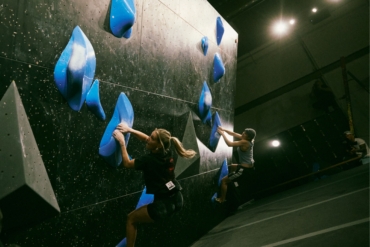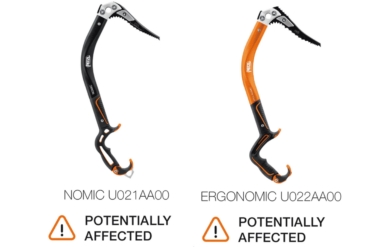Climbing holds often change hands a few times before retiring, but they’re usually headed to the dump. One company took the initiative to cut down on trashed holds.
When climbing gym owner Geert Voncken looked at the walls in his facility, he saw one big problem: garbage bolted all over them.
Because they’re full of compounds and chemicals, you can’t recycle traditional plastic climbing holds. So Voncken set out to give gym owners and route-setters an alternative.
Several years later, he and his business partner, Tim Mullens, think they’ve landed on the solution: Greenholds, the world’s first recyclable climbing holds.
Their company sources a supplier who collects polyamide (e.g., nylon) waste from manufacturing facilities. From there, Greenholds shapes its holds using injection molds rather than the typical silicon mold.
The best way to recycle the company’s holds is to send them back once you’re done using them. That’s true because (1) Greenholds can turn the old material into new holds, and (2) the company will give you 40% off on your next order.
And thanks to Mullens and Voncken’s manufacturing process and material choices, you can expect the holds to deliver much more on the sustainability front.
Going Green(holds)
Made from 100% waste polyamide, Greenholds use no virgin material. In other words, as Mullens put it, “no oil has to be pumped for [manufacturing] our products.” Also, Greenholds’ injection-molding process produces less waste from spent molds.
Mullens estimated a hold manufacturer uses a typical mold “about” 50 times. After that, it goes the way of all silicon: to the dump. Mullens said that as long as Greenholds maintains its machines, it can crank out holds endlessly. (That alone could be big in a quickly growing industry that currently pumps out around 10 million plastic holds a year.)
Once they’re out in the world and on your wall, you should be able to use and abuse them just as much, if not more, than standard holds.
Mullens and Voncken collaborated with local university students and landed on the most robust material possible. Mullens said the material resists edge chipping more than traditional plastic. The team’s vocabulary surrounding its products’ durability is self-assured: the website says “chipping [the holds] is impossible.”
Mullens also confidently said Greenholds are “stronger than any hold out there.” He should know — he and Voncken poured intensive testing and feasibility studies into the company’s 5-year pre-launch process.
View this post on Instagram
Once tests showed the product could punch at its weight, production and scalability became the tasks at hand.
Greenholds knew that it could compete on an efficiency basis with its injection molds. Mullens said the company’s current facility pumps out 30 holds an hour. And because polyamide is a thermoplastic (rather than a hardener like polyester or polyurethane), Greenholds can melt it to use again.
Seeking to Scale Responsibly
Recycling polyamide does require a specific process, so I recommend sending your oldies to the experts. For Greenholds, it’s simple economics: the company can save money by buying less raw material.
The way Mullens talks about it, the principles behind Greenholds — both in idea and application — concern more than just dollars and cents.
Because they can compete on efficiency, Mullens said the project could be uniquely scalable. But his and Voncken’s goal is not to keep it all for themselves. Instead, he hopes the company can eventually fold into a production capacity for other hold-makers.
“It’s important to say that we want to make climbing more sustainable, together with the market [for it],” he said. “So we are fully open for collaborations with other brands to produce for them with our production method.”
For now, it looks like all systems go at Greenholds. Funded by the Dutch government, the company launches now with three foundational hold shapes: a system disk, a campus rung, and a campus ball. By late spring 2023, the co-founders plan to release over 100 more shapes for setters to choose from.
Oh, and if you still weren’t convinced — the company just won an IPSO award, which places it among the “most outstanding products and services” in sports.
Pricing will likely make Greenholds appear prominently on big gym order sheets (at least at first). But if they’re as durable as the company says they are, you may never have to replace them.
Check it out at Greenholds’ website, where a complete (1-9) set of campus rungs costs €180 ($186).








